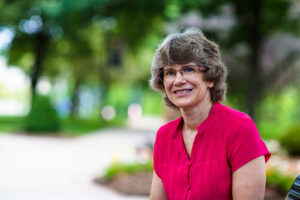Last Updated on July 20, 2016 by cassnetwork

KOKOMO, Ind. — At the age most people enjoy the rewards of a successful career — the house, the car, the fancy gadgets, and the bucket list vacations — Jacquie Bean quit her job, sold all of her belongings, and moved to a third world country.
At 54, Bean finds happiness in her tiny concrete block apartment, where she cooks with a toaster oven, and boils water on a hot plate to wash her dishes. The only hot water is in her shower, and that doesn’t last long. Temperatures soar over 100 degrees at times, and if the electricity goes out — which it does on a regular basis — she turns on a battery operated fan. With no car, she walks to work, an approximately eight-minute commute.
“I wish I had the courage to do this when I was younger, but 30 years ago you didn’t hear much about teaching overseas,” she said. “Now I live in Myanmar, I’ve been to Thailand, and I want to go to Vietnam and Africa.”
Bean, M.S. ’95, recently completed her first year teaching fourth graders at Yangon Academy, in Myanmar’s largest city. Her 20 students are amazed to learn that, in the United States, everyone can go to school. There are no public schools in Myanmar, so the only children who go to school are those whose parents can afford to send them to private schools.
“They couldn’t imagine getting an education for free,” she said, noting that people pay taxes in the southeast Asian country, just like in the U.S., but none of that tax money goes to schools. “Going to school is an honor, and their parents have to pay for it. They are so eager to learn, they just drink it up.”
The children learn in English, and most have been in English language schools since preschool. About 95 percent of the students are from Myanmar, with a few international students, including those from India and other Asian countries.
Desire for a change after 27 years teaching at Logansport’s Columbia Middle School led her to research job opportunities overseas. She found Yangon Academy through The International Educator, an online marketplace for teachers who want to work overseas. She chose Asia because she had already been to Europe, Central America, and New Zealand as a teacher, chaperoning student trips.
“I had never thought of Myanmar, because you hear bad things about it, but that’s where I decided I wanted to go,” she said, adding she is happy with her decision. “I didn’t know if I would like it, but I do.”
Her family worried about her safety, but Bean feels secure in Yangon.
“Myanmar is very safe, at least partially because under the former military government, if you committed a crime, the consequences were dire,” she said. “It’s safe; you just have to be careful where you go. There are certain parts of the country where foreigners are not allowed to go.”
She enjoys the country’s culture, and the polite, respectful people, noting most of them have had little interaction with foreigners while under the rule of an oppressive military junta from 1962 to 2011. The generals who ran the country suppressed almost all dissent, and were accused of gross human rights abuses. A gradual liberalization has been underway since 2010, and the country swore in its first democratically elected civilian leader in more than 50 years in March 2016.
“Myanmar really just opened up to non-Asian foreigners, and they’re still not quite sure how to handle us, whether they can come right out and talk to us. Having foreigners in the country is a new experience,” she said.
The government does not want foreigners staying in the country long term, so she and other American teachers have to leave the country for two days every 70 days. The school pays for airfare and a hotel, and Bean usually goes to Bangkok, Thailand, during those times, where she shops for items not available to her in Myanmar.
School support staff, who are Myanmar natives, handle travel and visa arrangements for the teachers, who are all Americans, and assist them with other tasks in the language, including paying bills.
“I would not recommend anyone move there who isn’t moving with a company or a school,” she said. “The average person there doesn’t speak English, and the Myanmar language is hard to learn, which makes life difficult.”
Bean and other teachers from the school live in a nearby housing complex, in an area that would be considered upper middle class.
“That’s just the way you live, and you get used to it,” Bean said. “Most people at home can’t imagine living like that. You get used to it, and it’s not a big deal.”
She plans to finish her contract at her current school, and then will decide her next move
“I don’t know if I will stay in Myanmar,” she said. “I’ve heard really good things about Thailand and Vietnam. I want to stay in that area another year, and explore Asia, and then I would be interested in Africa.”
Her time is limited, as most international schools do not accept applications from teachers older than 60. Once her international adventure is over, Bean plans buy a small home, and begin exploring the United States.
“I have experienced so much more than I could have experienced at home, and I probably appreciate the United States and what is has more than most people. The freedoms and opportunities here are something that aren’t available in many parts of the world,” she said.
Indiana University Kokomo serves north central Indiana.
SOURCE: News release from Indiana University Kokomo






